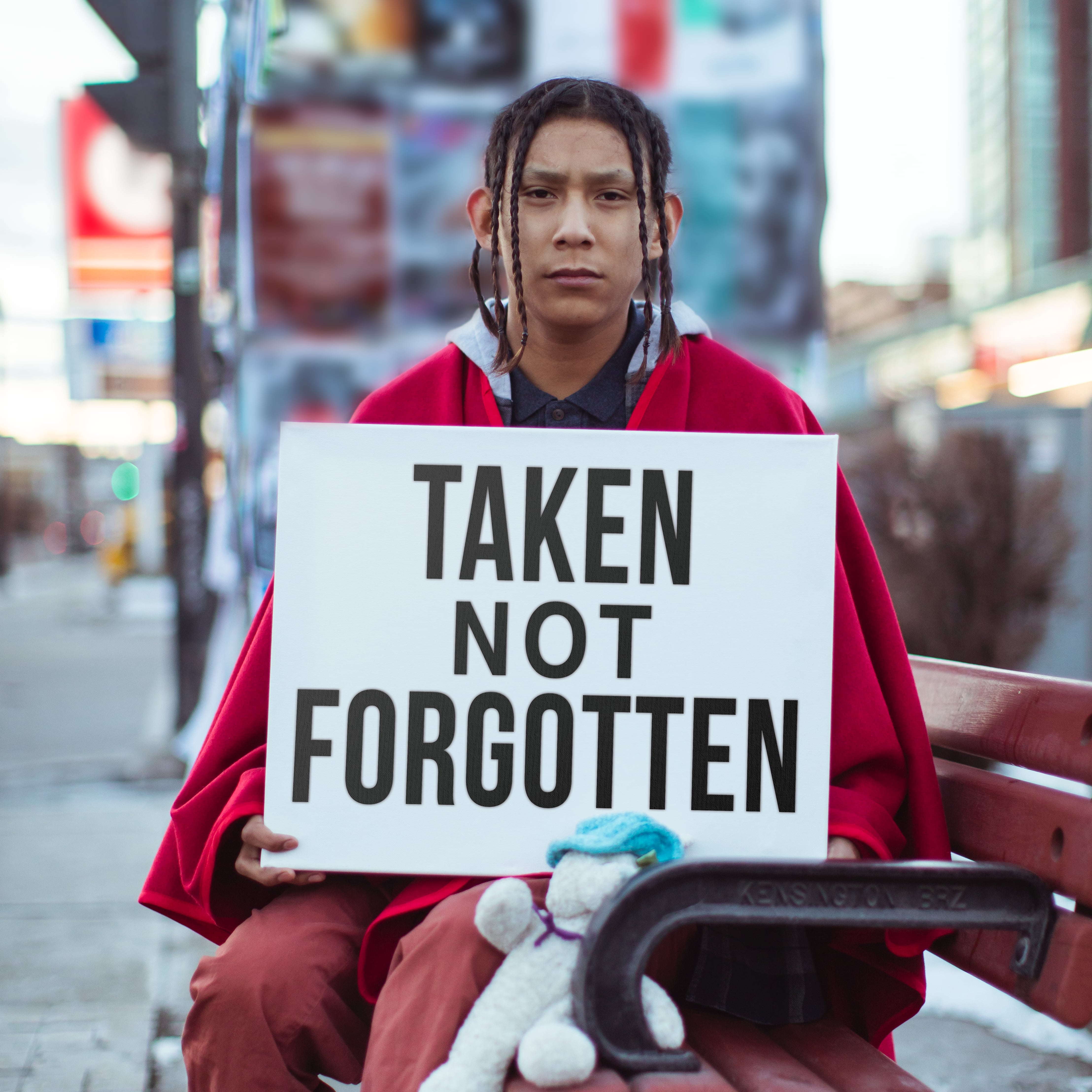
Indigenous women represent only 4% of the female population, yet represent 16% of all female homicides in Canada. The rate of homicide for Indigenous women in Canada is almost seven times higher than other women. Estimates place the number of cases of missing and murdered Indigenous women, girls, two-spirit and LGBTQQIA individuals in Canada over 6,000.
In 2016, the Canadian Federal Government launched a National Inquiry into Missing and Murdered Indigenous Women, Girls and 2SLGBTQQIA, in an attempt answer the difficult question – why?
Understanding Canada’s colonial history is key to understanding this crisis. Since its inception, the Canadian Federal Government has enacted and sustained multiple systems of genocide against Indigenous peoples. The profound traumas suffered under these systems have had inter-generational impacts, and are directly linked to the epidemic of violence seen today. Unfortunately, there is often a lack of historical context present in discussions around this issue, and facts are often confused, obscured, misunderstood or misrepresented in media.
#SacredMMIWG was launched in the months leading up to the release of the National Inquiry’s Final Report, and was designed to dispel some of the misconceptions surrounding the crisis of MMIWG2S+. The campaign served to educate the public on the generational impact of colonization, and encouraged all Canadians to be “Change Makers” through daily, conscious efforts of reconciliation. With stories and images gathered from coast-to-coast-to-coast, #SacredMMIWG called on all Canadians help to put an end to all forms of violence against Indigenous women, girls and 2SLGBTQQIA individuals in Canada.
#SacredMMIWG ran between February and July, 2019, in the months leading up to the release of the National Inquiry’s Final Report. The campaign was targeted to all Canadians and utilized Facebook and Instagram, as they were well-suited to host the media, and facilitate audience reach.
Twelve participants were selected for the campaign, referred to as “Change Makers.” The Change Makers were vocal advocates for social change, and ranged from family members to celebrities, including:
Lorne Cardinal – Actor, Public Figure
Clifford Crowchild – Son of Jacqueline Crazybull, killed 2007
Marlene Jack – Sister of Doreen Jack, missing 1989
Sharon Johnson – Sister of Sandra Johnson, killed 1992
Vanessa Brooks – Sister of Tanya Brooks, killed 2009
Elisapie Isaac – Inuk Singer/Songwriter, Filmmaker, Producer
Susan Aglukark – Inuk Singer/Songwriter, Activist, Role Model
Rinelle Harper – Survivor, Advocate
Florent Vollant – Innu Singer/Songwriter, Activist
Sarah Birmingham – Mother of Mary Ann Birmingham, killed 1986
Ashley Callingbull – Model, Actress, Activist
Buffy Sainte-Marie – Singer/Songwriter, Activist, Mixed-Media Artist
#SacredMMIWG functioned as a “Call to Action” in multiple ways. Placards specifically designed to open dialogue were held by Change Makers, with inscriptions: “I’m a Change Maker, Are You?” “Taken, Not Forgotten” and “Our Women and Girls are Sacred.” Change makers were also interviewed, with compelling excerpts featured alongside the visual media.
The Change Makers represented multiple communities across Canada, and were photographed by renowned photographer Nadya Kwandibens. Many bravely chose to be photographed at locations that were significant to them, such as Clifford Crowchild, Sharon Johnson and Vanessa Brooks, who were photographed where their loved ones were killed or their remins were found. Rinelle Harper also chose to be photographed at the location where she was severely assaulted.
Members of both The Grandmother’s Circle and The National Family Advisory Circle were also featured in #SacredMMIWG videos, where they shared a powerful, unanimous message about the need for support, from all Canadians, in ending all forms of violence.
The Truth Sharing Podcast series was also recorded simultaneously, which documented long-form interviews about the impact of MMIWG2S+ in Canada. In addition to the podcast, a series of behind-the-scenes videos were created to showcase resiliency of the Change Makers.
At the closing Ceremony Event, Kwandibens captured photographs while further interviews were conducted with family members in attendance. A final podcast episode was recorded at the event, and in the days that followed, released alongside the photos and interview videos. A live-stream of the event was also hosted by #SacredMMIWG and made available in 3 languages, across multiple platforms.
In order to maintain high levels of engagement over a relatively short campaign, roughly 1 to 3 posts were scheduled per day. In between all scheduled releases, Facebook and Instagram Stories were utilized to reach greater audiences with stylized images and captions. For accessibility purposes, all content was released in both French and English, and was captioned whenever applicable. All podcasts were recorded in the speaker’s native languages, translated and released with both French and English over-dubs.
The Numbers:
- #SacredMMIWG reached 1/3 of all Canadians (12.6 million people)!
- #SacredMMIWG videos played 41 million times, with engagement rates up to 19%!
- #SacredMMIWG content received 14.6 million total engagements!
The Social Good:
The results of the #SacredMMIWG campaign are truly incredible. Messages of support began to flood in almost immediately from individuals moved by the campaign. Artists sent works inspired by MMIWG2S+, teachers and students reached out in search of resources for lesson plans, projects and discussions about MMIWG2S+ in Canadian classrooms. Organizers sent photos of walks & rides they were inspired to host to raise awareness for MMIWG2S+. Daily offers to volunteer with, or donate to #SacredMMIWG were re-directed to local communities. Survivors of violence expressed feelings of empowerment after having heard Change Maker stories. Individuals struggling with image and identity expressed gratitude for the Indigenous representation in media. Hundreds of comments expressed compassion and empathy for those with lost loved ones, and hundreds more pledged to take action to end the violence.
With the release of the National Inquiry’s final report, which lists 231 Calls for Justice, the need for action is greater now than ever. Change does not happen overnight, but #SacredMMIWG is a monumental first step towards longstanding social change in Canada. If the objective success of this campaign is any indication of the nation’s drive towards a socially equitable future, then perhaps Canada is truly ready to heal and step forward – together.









